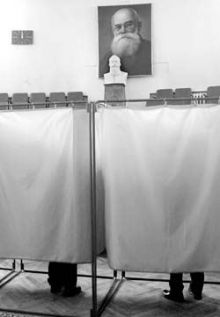A lot has been said and written about the parliamentary elections. There is no denying the Party of Regions’ victory. It is based on loyalty to the principles formulated in 2004 by the presidential candidate, Viktor Yanukovych, as well as by the glaringly poor performance of the Orange team. It is also a fact that the ideas of the Orange Revolutions continue being supported in the west of Ukraine. The forecast about the obvious mix of political preferences in the central regions has proved true. Hence the inference: the parliamentary elections have confirmed the existence of noticeable differences not only within the political elite, but also in the electoral moods in various regions. At present these moods can determined along the following lines: (a) recognition of Russian as the second official language, (b) accelerated integration into the European and Euro-Atlantic structures (e.g., NATO), or the revival of equal and mutually advantageous relations with the Russian Federation, stepping up the talks on the formation of the Single Economic Space, and (c) Ukraine becoming a unitarian or federal state.
Our political opponents promptly deleted the Party of Regions from the list of participants in the talks on forming the coalition in the next Verkhovna Rada, and did so as an ultimatum. The reason is the presence of principled differences with regard to the foreign and domestic policy. The Orange Revolution organizers declared that they wanted their own coalition based exclusively on the principles of their program. Let us try to analyze the objective reasons for the difference in the approach of millions of Ukrainian citizens to the idea of developing their independent state.
Let us remember what we were taught in grade and higher schools, namely that the good Ukrainian Bolsheviks, after proclaiming Kharkiv the capital of Soviet Ukraine, launched a campaign for the “reunification of original Ukrainian lands” and against the White Guard, nationalism and all the foreign occupiers. They won in the end. Everything that didn’t fit into this interpretation was either concealed or distorted. Now we have freedom and independence. But once again we have bent attitudes serving the benefit of new political trends in the development of society. This is especially noticeable in the publications of those identifying themselves as nationally conscious forces.
People are being persuaded that the Russian language, being predominant in the east of Ukraine, was enforced there by what is described as an occupying force; that any lifestyle different from that adopted in Halychyna is un-Ukrainian. And that the slobozhany [i.e., residents of Ukraine’s central and eastern territories] are narrow-minded, Russified individuals who can’t be rated as full-fledged Ukrainians. This trend is very dangerous because rewriting history cannot help unify this people. The Orange government is trying to make the best use of every such “new historical” ideological notion, apparently expecting that by suppressing the originality of the Eastern Ukrainians, destroying their native tongue, forcing them to adopt a lifestyle which is not characteristic of them, will help this government reign supreme all over Ukraine.
The number of votes collected by the Party of Regions during the parliamentary elections is another convincing proof that such plans may once again bring about artificial controversies between the regions. Pondering the possibilities of coalitions after the parliamentary elections in Ukraine, I think that certain undeniable historical facts should be cited and analyzed in view of recent events here.
As for the establishment of Soviet power in Kharkiv in 1917, the situation seems clear enough. The situation with the Union Day would seem likewise clear. In fact, our school children know that January 1918 saw the formation of the Ukrainian National Republic (UNR) in Ukraine, and that the territories that were still parts of Austria-Hungary proclaimed the formation of ZUNR West Ukrainian National Republic). It is also true, however, that Ukrainian statehood proved short-lived and Ukraine ended up rifted. Whereas the Soviet historians did their best to leave the reunification fact out of their writings, a number of current apologists of Ukraine’s “new way” are obviously overstating the achievements made by the UNR and ZUNR.
The UNR, proclaimed after the Bolshevik coup in St. Petersburg in October 1917, was regarded by its architects only as an autonomous part of federated Russia; it was considered a sovereign democratic republic only since mid- January 1918. That fall an uprising against Hetman Skoropadsky broke out. The Dyrektoria was formed to lead it, known as the “interim government of the UNR.” It included, among others, Volodymyr Vynnychenko (Chairman) and Symon Petliura. Even the first official meeting of the government in Vinnytsia revealed differences between these two politicians and the government ended up divided between the supporters of the parliamentary and Soviet political systems. The Dyrektoria wholeheartedly believed in foreign countries’ aid, primarily those of the Triple Entente. The latter was suspicious about the UNR and regarded Ukraine only as a southern territory of Russia. They promptly launched a sea- landing operation at Odesa. The French general D’Anselme demanded that all Ukrainian troops vacate the entire Odesa territory. Russia’s People’s Commissariat for Foreign Affairs [the Bolshevik version of the foreign ministry] informed that Russia did not recognize Ukraine as a sovereign country in view of the annulment of the Peace Treaty of Brest. We know well what happened afterward. The Dyrektoria traveled on trains. The Triple Entente came up with an ultimatum reading that they would support it, but only on certain conditions, namely that the Kyiv-proclaimed neutrality would be annulled, that all of Ukraine’s railroads and most its mines be placed under French control, and that 300,000 Ukrainians be enlisted to fight the Red Army. Also, they wanted Petliura, Vynnychenko, and Chekhovsky out of the political leadership. Our politicians adopted a special declaration expressing, among other things, profound gratitude to the French military command. This declaration also urged the “allies” to help the Ukrainians build their state. General D’Anselme responded by stating that the Triple Entente did not recognize Ukrainian independence.
I am not trying to belittle the Dyrektoria’s role or overstate the role played by the Red commissars. However, the support of what I see as an almost inevitable Bolshevik dictatorship on the part of that great many people ought to be explained, in part, by the collapse of the economy, rampant corruption, and Dyrektoria’s total loss of control over the political and social processes (aren’t you tempted to draw parallels with certain current realities?).
The relationships between the UNR and ZUNR politicians took a nonetheless dramatic course. Mazepa, one of the Dyrektoria’s leaders, wrote: “It hasn’t gone as far as formally severing relations between the governments of Halychyna and Naddniprovia, yet they have been going their separate ways.”
ZUNR leaders alternated between supporting the Western Ukrainians’ war against the Poles and the Roman Catholic Church and tried to make deals, out of the public eye, with Berlin, Warsaw, and even Moscow. Petliura signed a defeatist agreement with the Polish government, whereby Eastern Halychyna, Kholmshchyna, Pidliashshia, and parts of Polissia and Volyn were joined to the Rzeczpospolita. That Union resulted in sheer betrayal on the part of the politicians of the Ukrainian people, so that a considerable number of Ukrainians ended up under the foreign yoke.
It is necessary to open these tragic pages of history from time to time. Today, a number of politicians from the Orange camp want simply to rule and build fortunes for themselves and their close and dear ones rather than outline the ways of further progress with the rest of society. During the parliamentary elections the east and south of Ukraine graphically demonstrated their choice: the Party of Regions. To an extent this also shows what the people think of the current Ukrainian government’s performance in the economic, political, social, and cultural realms.
Ukraine still has a chance. Let’s hope she won’t lose it this time.








